Tuesday December 11, 2007 Letter to the Editor:
DEAR people of the CNMI and voters of Precinct 1. My name is Juan Kapileo, a resident of As Lito, and I would like to share my thoughts about our island and the recent events that have transpired.
First, I am in disagreement with Ms. Tina Sablan saying that the people of Precinct 1 should not be surprised with her actions in participating with the protest action because she had already stated her stance on granting improved immigration status to guest workers and the federalization of local immigration.
The people of Precinct 1 voted for a person who will represent them and be their voice in the House of Representatives.
Your personal feelings about immigration and federalization are no longer the issues. We are the ones who voted you and you need to get abreast of the issues that plague your “voting” constituents.
There are many people who are just as surprised as I am with the path you are heading. Many people like me voted for you because you were for “transparency” in government. Had I known that the unity march and improved immigration status for guest workers were your first and primary agenda my family and friends would have not voted for you. I’m sorry but I feel that there are more important issues than these.
Since the U.S. Congress increased the minimum wage it has caused despair here. There have been businesses closing, jobs lost, hours cut and employee benefits reduced. Where is the U.S. Congress now? Where is the economic package to counter the impact of the minimum wage increase? What economic plan do you and your advisors have in place for us?
And now you want federalization? Guam considers itself a colony of the United States and is still pushing for a commonwealth status and control over its own immigration. It shows just how important it is for small islands like ourselves to have more control over immigration and other local matters.
Let’s assume we are federalized and go on with the minimum wage increases. What can the CNMI do to attract businesses to an already bleak economy without the flexibility to lure investors? How can we attract businesses without control of our immigration and too much federal restrictions? What about “OUR” submerged lands that we do not have control over? How can we stimulate tourism with high air fares and other islands such as Guam and Hawaii with the same tourist attractions competing for the same market? How do you propose to solve our economic problem with the federalization of local immigration? What plan do you have for the economy when the federal government could not figure out since 1979 to fuel it? How do you plan to tackle the high cost of fuel? How do you plan to tackle the problems with CUC? How do you plan to tackle the tax refund problem? How do you plan to solve our dwindling revenues? How about the problem with our Retirement Fund? What plan do you have for medical referrals, the lack of police officers and equipment, an inefficient hospital system and lack of supplies, including blood?
Please review the historic records because the federal government could not figure out how to create a stable and viable economy here since 1979.
I think that there are vast problems that you could have tackled but I guess everyone has their own priorities and local problems are the least of your concerns.
People use Guam as a model for federalization. I attended the field hearing on Guam and also the meeting for just the local residents and I was surprised at the disappointed residents expressing themselves about the lack of information coming from the federal government about the military buildup. Many expressed negative sentiments about the lack of business opportunities since the military base has its own schools, and will also build its power plant and use its own water and sewer instead of tapping into government of Guam lines. The military has built a big shopping mall, bowling complex, movie theater, Starbucks, etc. to ensure that its personnel stays within the bases. Oh yeah, we are going to benefit from this base relocation. Excuse me but I must have missed something here — how can we attract them with the high cost of air fare and room rates?
This year the feds tried to federalize Guam Customs without any prior notice being provided to the government there. But Guam pointed out that the feds could not do it unless the U.S. Congress changed the Guam Organic Act.
In the absence of any military base, garment industry revenues, lack of tourists arriving or new business investments, there will be no real positive benefits from federalization. Why don’t you advocate for the CNMI delegate provision attached to H.R. 3079 that provides for “limited voting powers.” I thought that we were all U.S. citizens.
Although the CNMI cannot have a real federalized immigration system to use as a role model, at best we just have to rely on the United States immigration system that has been the guide for all of us to follow and is responsible for more than 15 million illegal immigrants. Federalization is nothing more than taking the CNMI and bringing it back to colonial rule.
I believe that before people advocate federalizing our immigration and labor, they should go to American Samoa, Guam, Palau and the FSM and see the positive and negative effects of local or federal control of immigration on their economies.
Ask yourselves why Guam is also pushing for control over its immigration to expand its tourism market in China. Ask yourselves what sins or mistakes that the CNMI is being accused that don’t exist in the United States or other parts of the world.
I also want to remind the people of the CNMI that the people of Guam and Hawaii do not want any provision for an improved guest workers immigration status to be in H.R. 3079. We had a mandatory exit rule that was passed in the 1980s and 1990s but legislators and businesses wanted it repealed. The new labor reform law is intended to protect local jobs and promote jobs for local people and gradually phase out the dependence on contract workers.
I don’t think that it’s fair to provide an improved immigration status for contract workers who have been here for 10 or more years. What about the fate of the majority of contract workers who did not fall under this 10-year provision? Let’s not be discriminative and selective — let’s give it to everyone.
Federalization is nothing more than another step at making us a colony again and this is not right. Let us brace ourselves and see how many more people will be laid off from jobs and businesses packing up as the next minimum wage increase is set to take effect in 2008.
JUAN KAPILEO
Voter of Precinct 1
As Lito, Saipan
.
.
TAOTAO TANO HAD SPOKEN
- A direct impediment to the human right to self-determination
- 12808 st - Taotao Tano rebuts Pete A. in interview with KSPN 2 News
- TAOTAO TANO CNMI sents letters to the community
- 011608 st - SEND THEM HOME
- 011608 mv - Guest worker faces deportation
- 011608 mv - TAOTAO TANO SLAMS FEDERAL LABOR OMBUDSMAN
- 121407 mv - Trampled by foreigners
- 121407 mv - The despair of the indigenous people
- 121407 st - Familiarity breeds contempt
- 121407 st - 'Be selective on who to bring in'
- 121407 st - This land belongs to the indigenous
- 121407 st - To the people of Precinct 1
- 121407 mv - Think again
UPDATES by links
- 020808 mv - Fitial ready to testify in DC vs federalization, wage hike
- 020108 mv - US Senate panel OKs federalization bill
- HOUSE APPROVED 3079
- 121407 mv -Fitial says feds applying ‘socialism’ to NMI
- 120707 mv - Bingaman answers Fitial
- 120307 mv - US House may vote on NMI federalization
- 110607 mv - Cohen: Fitial administration ‘misinterpreted’ nonimmigrant provision
- 110207 mv -Guest workers brace for final version of federalization bill
- 110207 mv -Gov’t to recalculate numbers of migrants before year ends
Monday, December 10, 2007
No to federalization
at
5:54:00 AM
Posted by
TAOTAO TANO CNMI
![]()
Subscribe to:
Post Comments (Atom)
OUR FALLEN HEROES
SAME THING WILL HAPPEN HERE - JUST CHANGE THE NUMBERS
JUST CHANGE THE NUMBERS TO CNMI NUMBERS AND
THE COHEN PLAN WILL HARM THE CNMI IN THE SAME WAY
CURRENT IMMIGRATION POLICIES WILL DAMAGE THE USA.

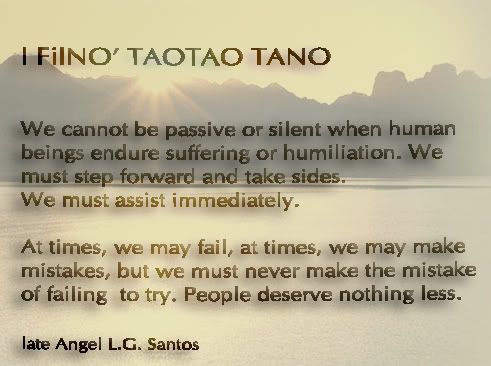


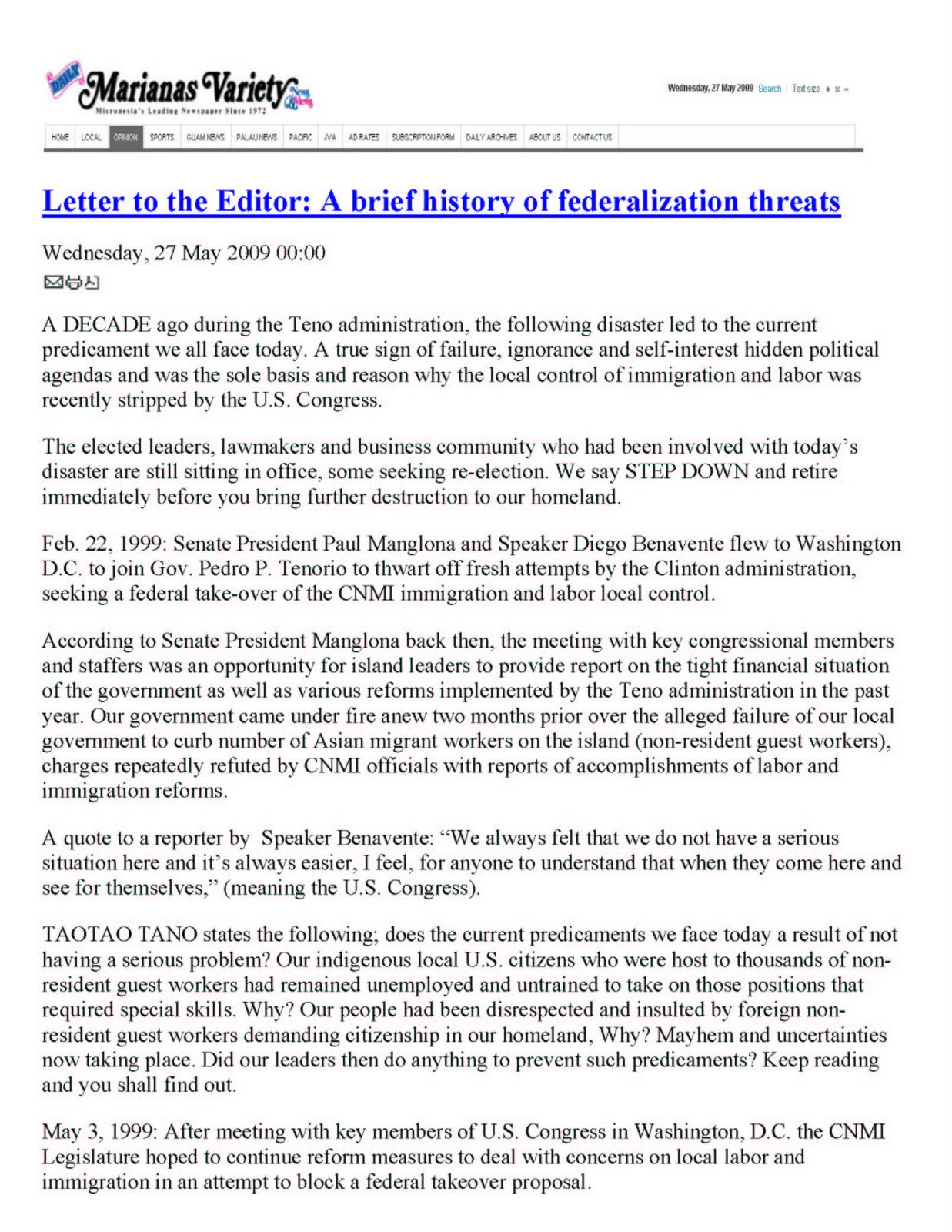

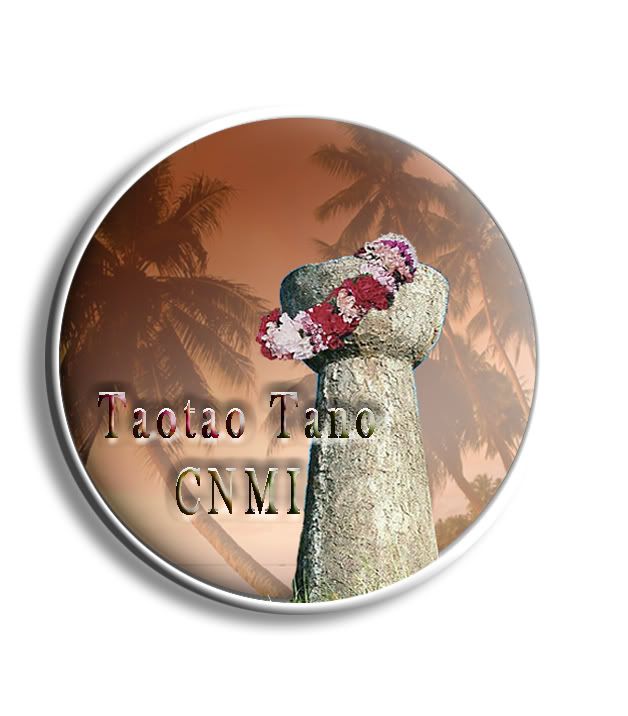


















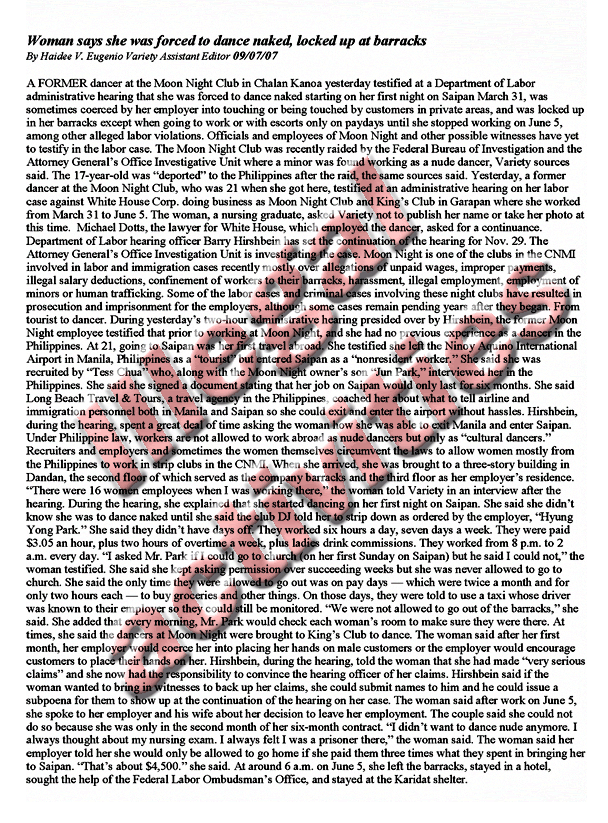
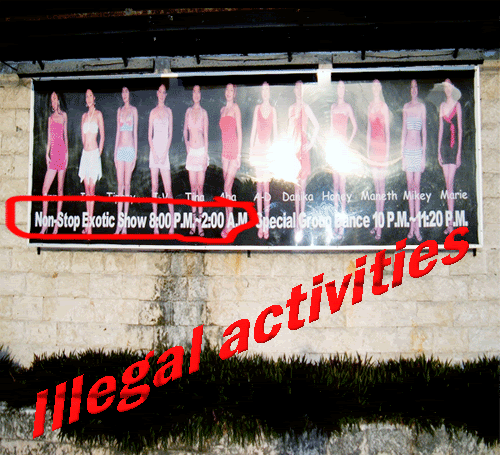


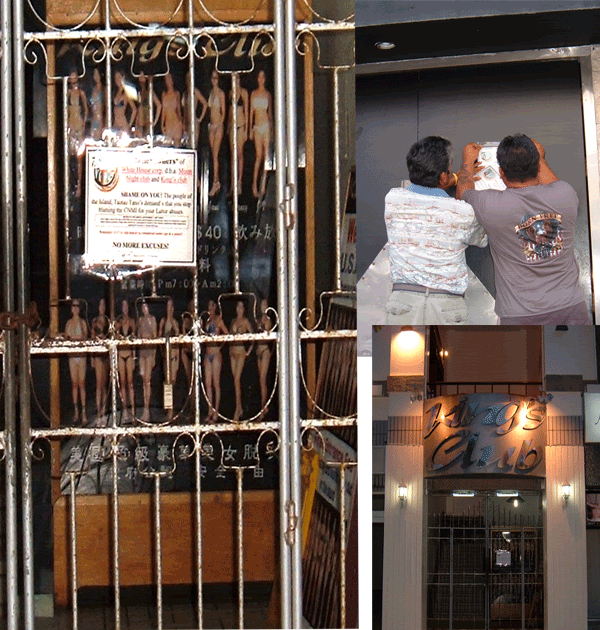
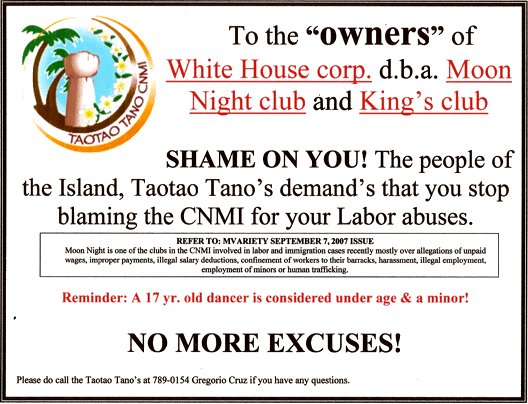

1 comment:
with regards to the serious issues, why didn't juan ask the same of the previously elected officials?
at least he's asking now...
Post a Comment